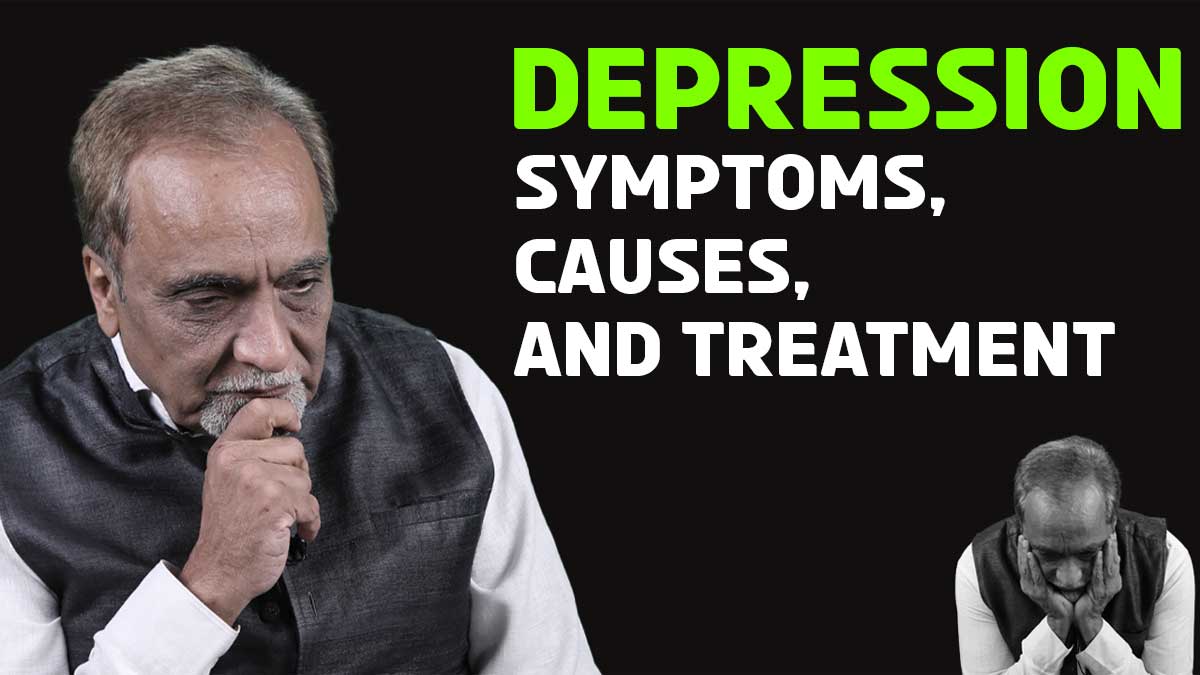
Depression is a widely used term that can be found in various contexts, from financial downturns to gloomy weather conditions. In the realm of public health, it takes on a whole new dimension. This week in our exclusive 'A-Z of Mental Health' series, featuring insights from Dr Nimesh Desai, Senior Consultant Psychiatrist and Former Director, IHBAS, Delhi, we delve into depression, and its symptoms, treatments, and detection methods.
Table of Content:-

“Depression, in the clinical sense, refers to a persistent state of sadness, mood fluctuations, emotional turmoil, and altered social behaviours that endure for two weeks or more”, said Dr Desai. According to the World Health Organization (WHO), the impact of depression may endure over time, with the potential for recurrence, significantly hampering an individual's capacity to lead a fulfilling life.
Types of Depression

Depression manifests in various forms, and our expert elaborates on some of them:
- Bipolar Depression: Linked to bipolar disorder, this type of depression occurs in cycles.
- Recurrent Depressive Disorder: A biological disease marked by recurrent episodes.
- Chronic Depression: This long-lasting condition results from a combination of genetic and circumstantial factors.
- Environmental Factors: Depression can also be triggered by external factors, such as social, psychological, financial, and interpersonal influences.
“Depression often coexists with physical health conditions, such as heart attacks, diabetes, and thyroid disorders”, added Dr Desai.
Also Read: Postpartum Depression: Expert Lists Its Symptoms, Risk Factors, And Importance Of Seeking Support
Recognising Depression
“Statistics show that depression affects a minimum of 5% of the population at any given time, with 1 out of 20 individuals grappling with this condition. With a significant impact on life expectancy, depression is a crucial issue that needs recognition”, highlighted Dr Desai.
Dr Desai added, “Prominent figures, including Leo Tolstoy, Guru Dutt, Meena Kumari, Robin Williams, Deepika Padukone, and JK Rowling, have openly discussed their struggles with depression and the subsequent path to recovery, sending a positive message to those in need."
Identifying the Signs

Recognising depression can be challenging, but there are some key indicators to look for:
- Emotional behaviour: Persistent feelings of sadness or emptiness.
- Thought behaviour: A negative outlook on oneself, the world, and the future.
- Lack of motivation: A noticeable decrease in the desire to engage in activities or work.
Dr Desai said, “It is essential to distinguish between ordinary sadness and clinical depression. Everyday challenges and hardships are part of life, but in cases of depression, prompt treatment is vital.”
Treatment of Depression

“Depression is not just a personal struggle; it affects daily life, relationships, and overall well-being, making its treatment a public health priority”, emphasises Dr Desai. Here is why it needs to be treated:
- Suicidal Risk: One of the most alarming consequences of depression is the potential for suicide.
- Physical Ailments: Untreated depression can lead to various physical health conditions.
- Weakened Immune System: Prolonged depression weakens the immune system, leaving individuals vulnerable to illnesses.
- Comorbid Conditions: Both physical and mental health issues can arise when depression goes untreated.
Dr Desai said, “Treatment approaches have evolved over the years. Regardless of the root cause – whether external, internal, or biological – severe depression often necessitates medication.”
He added, “Counselling and psychotherapy are appropriate for mild depression, but treating chronic depression often requires a comprehensive approach, including medication, counselling, psychotherapy, and support from loved ones.”
“Depression, while one of the most challenging health conditions, is also one of the most treatable. Effective, low-cost treatments are available, offering hope and relief to those affected”, added Dr Desai.
Also Read: International Yoga Day 2023: Expert Explains How Yoga Helps In Managing Depression
Prevention: A Vital Step
For individuals dealing with prolonged physical illnesses or challenging economic conditions, additional precautions are essential. However, for the general population, practising mindfulness and savouring life's moments can go a long way in preventing depression, asserted Dr Desai.
Practise This Everyday

- Step 1: Close your eyes.
- Step 2: Relax your mind
- Step 3: Recall the positive things around you and appreciate them.
- Step 4: Recall the past or present positive experiences of your life.
- Step 5: Eliminate negative thoughts and try replacing negative thoughts with positive or at least neutral ones.
Bottomline
Dr Desai concluded, “Understanding and addressing depression is pivotal to individual and public well-being. It is a manageable condition, and with the right approach, individuals can regain their quality of life.”
[Disclaimer: The information in this article is shared by a registered healthcare professional and is for informational purposes only. We advise you to not substitute this information with medical treatment. It is necessary to visit your expert if you notice any complications.]
Also watch this video
How we keep this article up to date:
We work with experts and keep a close eye on the latest in health and wellness. Whenever there is a new research or helpful information, we update our articles with accurate and useful advice.
Current Version
Nov 08, 2023 02:30 IST
Published By : Chanchal Sengar